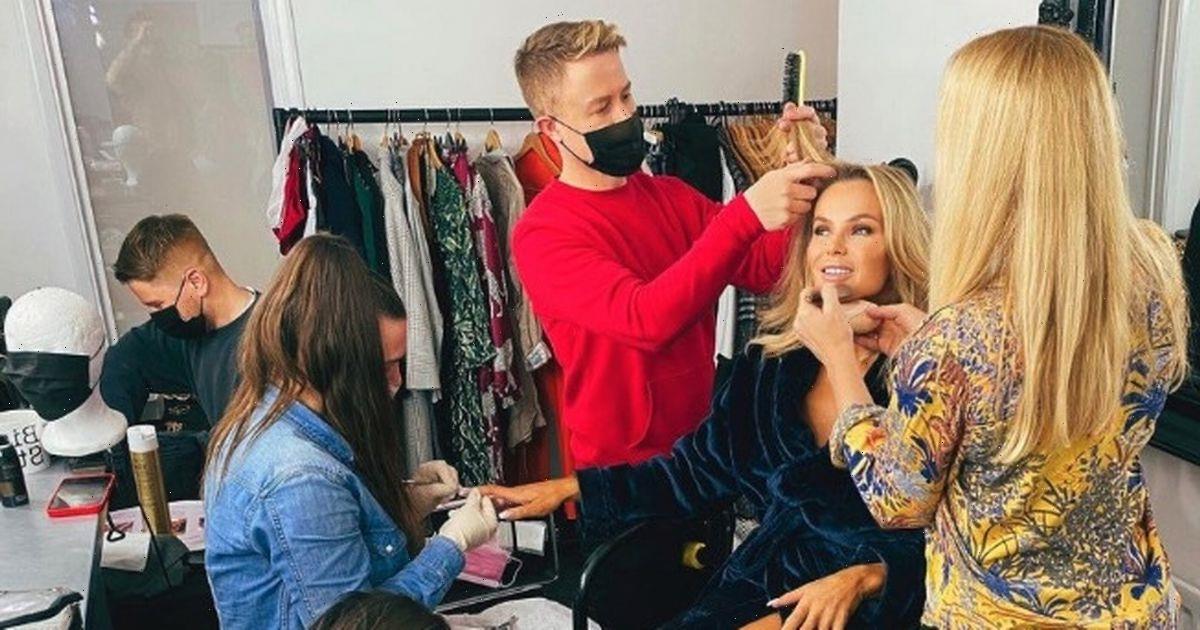Grammy nominations are always fraught with drama, but it started early this year — six weeks before the nominations are even announced — when the president of Kacey Musgraves’ record label fired off an impassioned letter to Recording Academy chief Harvey Mason jr. on Sunday, imploring him to reconsider the decision not to count Musgraves’ new album, “Star-Crossed,” in the 2022 Grammys’ country categories.
While Mason is the head of the Recording Academy, technically the decision was not made by him: It was made by the Academy’s country screening committee, an anonymous group of artists, creatives, executives and others who determine which recordings belong in which genre categories. (Their identities are not publicized in order to avoid outside influence.) Screening committees are separate from the controversial “secret” nominating committees, which previously determined the final nominees’ lists after the greater electorate had voted upon them, and were eliminated earlier this year after years of criticism and accusations of self-interest, culminating in the Weeknd being shockingly excluded from all nominations last year.
This year — according to the letter to Mason from Musgraves’ label head, Universal Music Group Nashville president Cindy Mabe — the country screening committee determined that the singer’s new album actually belongs in the pop categories. That actually is a legitimate argument for virtually any knowledgable music fan who listens to “Star-Crossed,” but is dramatically contradicted by the fact that the album sounds stylistically similar to (and was created by many of the same people as) Musgraves’ previous effort, “Golden Hour,” which won album of the year in 2019 — and three country Grammys.
Among many other points — including the longstanding low female representation in country Grammy nominees, not to mention country radio — Mabe effectively accuses the people on the screening committee of acting in self-interest, sensing that Musgraves’ elimination from the country category would create opportunities for artists they favor.
“The idea that a handful of people including competitors, who would benefit from Kacey not being in the country category, are deciding what is country only exacerbates the problem,” Mabe writes in her letter to the Academy chief. “The system is broken and sadly not just for Kacey Musgraves but for our entire genre because of how these decisions are made for music’s biggest stage. Building roadblocks for artists who dare to fight the system is so dangerous and against everything I think the Grammy’s stand for. But that’s where we are today.”
But is that actually what happened? One Nashville insider tells Variety that the screening committee went through Musgraves’ album track by track and decided that although there were some more country-leaning tracks on it, there weren’t a sufficient number for it to be considered a truly country album. And while one could certainly give “Golden Hour” the same test and come to the same conclusion, the screening committees usually have at least some different members each year. “If you put a gun to my head, I couldn’t tell you whether it’s country or pop,” the insider said — a comment that could be made about any number of ostensibly country albums from the past several years.
The insider also said that the country screening committee sent the album to the pop committee to see which category the album fit, and would have reinstated it for the country category if pop rejected it — but the pop committee agreed that that genre was the rightful home for “Star-Crossed.”
After Mabe and Musgraves’ manager, Jason Owen, learned of that result and made their objections known, the Recording Academy made what is considered an unusual move to further adjudicate the matter, sources say. The pop-or-country question was taken to the core committee that usually only oversees the top four general categories, to see what its members, who represent a number of different genres, thought. The core committee also agreed: It’s primarily a pop album.
The decision was split, though: A song that Musgraves and her label submitted as a country song, “Camera Roll,” stayed in the country song category.
As for the contentious decision on the album itself: “I can argue both sides, because they’re both very legitimate,” says an insider. “But if the country committee had an agenda, the pop committee would not have the same agenda. You have 20 or more people in a room, and this one went to three different rooms” — meaning the country screening committee, followed by the pop committee, followed by the final core committee. In the end, there were more than 60 people involved in making or certifying the decision, “and they pretty much all went: ‘It’s a pop record.’”
This scenario, which Grammy insiders agree is not only possible but likely, essentially puts the decision down to musical differences, although it’s rare to find any creatives or executives qualified to serve on screening committees who don’t have at least some interest in the final nominee list, even though they are supposed to recuse themselves when such decisions hit too close to home.
Musgraves is hardly the first to face the is-she-or-isn’t-she-country? question. Most famously, Taylor Swift made the shift from country to pop categories before her — but it came as a result of her choosing, when “1989” was submitted for (and won in) pop categories after she’d previously only contended in the country division, along with general categories. This came after she went public in advance of the album declaring she had “picked a lane,” and the lane was pop. Her music was always pop to a degree, but “1989” made it more emphatic in essentially ditching the acoustic guitars, mandolins and violins in favor of keyboards and electronics.
Although Musgraves never made a Swift-like statement that she’d gone pop, like Swift did, a business move may have made it for her: Earlier this year, she signed a new deal that saw “Star-Crossed” being released jointly through both UMG Nashville and Interscope, a more pop-leaning Universal label that is home to Lady Gaga, Billie Eilish, Olivia Rodrigo and a host of hip-hop superstars. And her Nashville label didn’t take any of the songs to country radio. It’s hard to imagine that those moves went unnoticed by the screening committee.
For her part, Musgraves weighed in on Wednesday afternoon with a characteristically wry Tweet:
Mabe portrays the Musgraves disqualification as a dark hour for country music. “I haven’t slept all weekend because I’m really sad for our format,” she writes. “I’m sad for fans of our music and the ramifications of how we’ll continue to define success in country music. This short-sided, biased decision will send ripples throughout our format to continue to insure that the message is sent that country music can only be for the limited few that enjoy the same perspective.”
Fair points, and it’s possible that at least some of Mabe’s accusations of self-interest are valid; this is after all a business, and a Grammy Award isn’t just the music world’s biggest honor, it’s an almost guaranteed sales and profile boost. It’s not difficult to see why it might be in Musgraves’ and her label’s interests to keep her within the country division, meanwhile — she’d face far less competition to win the less crowded country album competition than she will in winning or maybe even getting one of the five nominee slots for pop album.
It’s also possible that when the nominations are finally revealed on Nov. 23, Musgraves will have a Best Country Song nomination for “Camera Roll,” as a source told Rolling Stone, which would at least lessen the intensity of this conundrum (although not the confusion). But at a time when the Grammy Awards are working hard to emerge from years of unseemly controversies, at least this one seems to be about music.
Representatives for the Recording Academy, Musgraves and Mabe did not immediately respond to Variety’s requests for comment.
Source: Read Full Article


